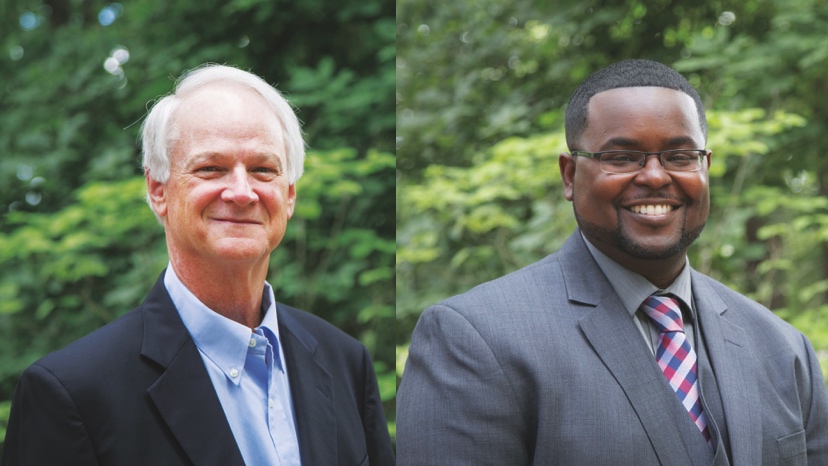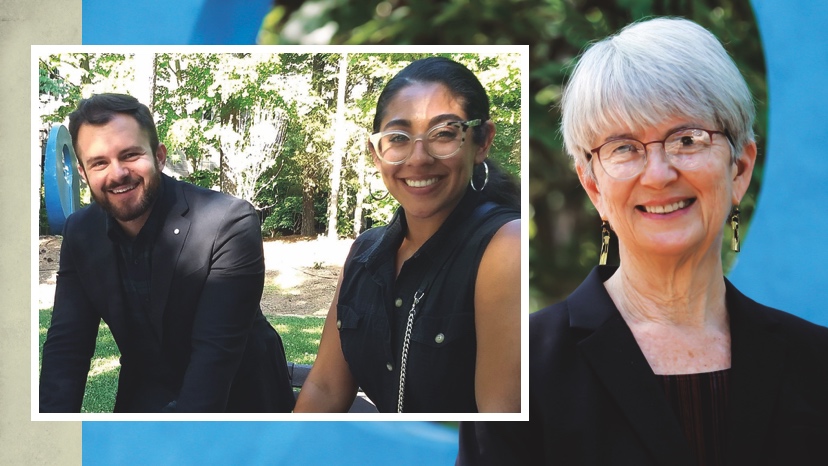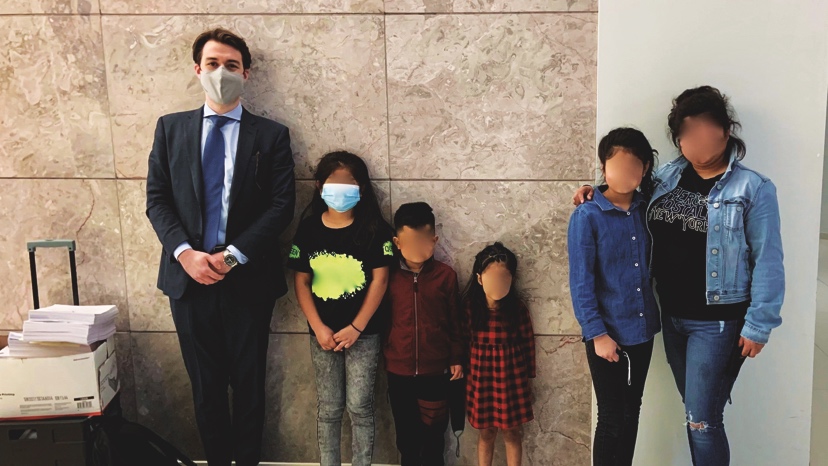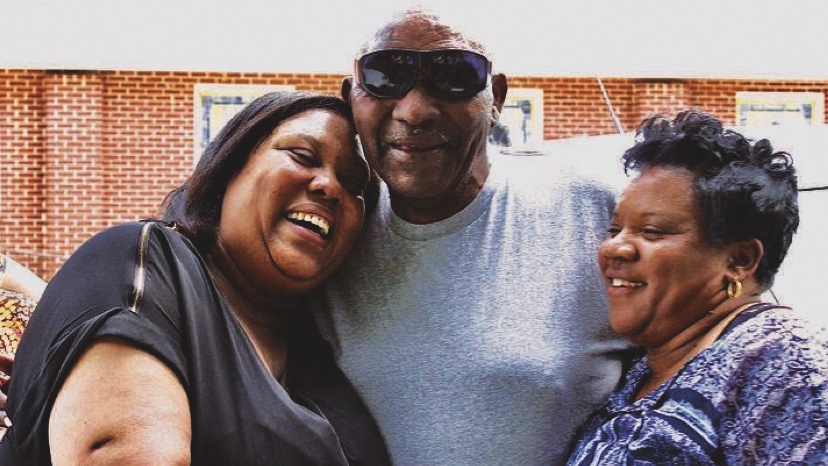Clinic News
A digest of recent advocacy, achievements, and outcomes from Duke Law’s clinics
Civil Justice Clinic

Clinical Professor Charles Holton ’73 and Clinical Professor Jesse McCoy
The Civil Justice Clinic received a cy pres award in March that is being used to further the work of its Eviction Diversion Program.
A cy pres award is a charitable distribution from funds remaining from a class-action settlement after the class members, fees, and expenses are paid. The award to the clinic came from a case in North Carolina state court against Southwood Realty Company, a property management company that in April 2020 agreed to pay $7.09 million to settle claims it unlawfully collected various eviction filing fees from tenants.
The gift carried only the stipulation that it benefit the Durham Eviction Diversion Program, according to the settlement order signed by North Carolina Superior Court Judge Allen Baddour. A similar award was made to Legal Aid of N.C. (LANC), which co-administers the Eviction Diversion Program with the Duke clinic.
Clinical Professors Charles Holton ’73 and Jesse McCoy, respectively the clinic’s director and supervising attorney, called the gift “a very welcome surprise” and credited plaintiffs’ co-counsel Karl Gwaltney of Maginnis Howard and Patrick Wallace at Whitfield Bryson, both of Raleigh, with recommending the Eviction Diversion Program as the recipient. While the clinic did not have a role in the Southwood case, Holton and McCoy regularly consult with lawyers across North Carolina about housing and eviction matters.
“We understand how beneficial your organization is for an underserved community and are excited to contribute to its continued success,” said Gwaltney.
The clinic used some of the funds to hire student summer interns in anticipation of a significant increase in eviction filings expected after the expiration of a national eviction moratorium. Additional funds are being used to support other aspects of the program.
Health Justice Clinic

The Health Justice Clinic was part of a legal team that secured coverage by Blue Cross Blue Shield of North Carolina (BCBSNC) for gender-affirming facial feminization surgeries for transgender individuals.
Along with the Transgender Legal Defense & Education Fund (TLDEF) and two law firms, the clinic convinced the insurer to reclassify such procedures as medically necessary rather than cosmetic for transfeminine members. As a result, two clients whom the clinic represented after their claims were denied will have insurance coverage for their surgeries. The legal team also represented Equality North Carolina and the LGBTQ Center of Durham.
“This change has the power to affect so many individuals in ensuring that they feel comfortable in their bodies and represents an important step in making health care more inclusive,” said Serena Tibrewala ’21, who worked on the policy initiative. Andrea Boutros ’21, Alex Cochran ’21, Edward Gonzales ’22, Ada Lin ’21, Kailen Malloy ’21, and Amanda Ng ’20 also worked on the project over three semesters, along with Clinical Professors Allison Rice and Hannah Demeritt ’04, the clinic’s director and supervising attorney, respectively.
Duke Law student-attorneys worked on several matters: attempting to engage BCBSNC in structured negotiations over the policy; and direct representation of two individuals, one on an appeal to the insurer on her coverage determination and another on drafting a structured negotiation letter to her employer over offering insurance that excludes coverage for the procedures. Almost all of the work was done virtually due to the coronavirus pandemic shutdown.
BCBSNC is the largest health insurer in North Carolina, covering 3.8 million members through employer-provided and individual plans. The policy change means that a request for facial feminization procedures will now be processed and assessed for medical necessity like any other claim.
Said client Kathryn Vandegrift: “Transgender health care is health care, and health care is a human right. No one should be denied the medical treatment they need. Knowing that care may be within reach has me hopeful that my life might finally move past transitioning. I might finally be able to exist fully as myself.”
Immigrant Rights Clinic

Students in the Immigrant Rights Clinic secured significant resolutions during the spring semester in two separate matters: grants of asylum for three children seeking refuge in the United States after fleeing domestic violence in Honduras with their mother and grandmother; and the release from immigration detention of a client who had been held by federal authorities for 16 months.
Luca Tomasi ’21 and Andres Paciuc ’21 represented the children at their seven-hour affirmative asylum interview in Arlington, Va., in March, receiving notice of the positive result in early May.
After receiving the family’s case on referral from a California-based asylum organization in 2020, clinic students identified seven separate asylum claims within the family. They continue to represent the mother and grandmother as their cases proceed in Charlotte Immigration Court under the supervision of Clinical Professor Kate Evans, the clinic director, and Supervising Attorney and Senior Lecturing Fellow Shane Ellison.
Alex Bednar ’21, Andrew Frank ’21, and Sam Moore ’21 gathered evidence, drafted affidavits, prepared expert declarations, and developed the core legal theories. Natalie Pate ’21, Christine Mullen ’21, and Lucas Fernandez-Rocha ’20 identified the children’s independent asylum claims and filed the initial asylum applications on their behalf. It took many interviews for the family to feel comfortable enough to share their painful memories, and weeks to peel back the layers of their experiences, Moore said.
Clinic client Luis Juarez emerged from immigration detention on June 16 following an agreement by Immigration and Customs Enforcement (ICE) to release him on bond. The clinic had filed a petition for a writ of habeas corpus in November 2020, challenging Juarez’s lengthy civil detention absent a determination that he represented a flight risk or danger to the community.
Clinic students Pate, Andrew Lindsay ’21, and Mario Moreno ’21 teamed up with the Immigration Law Clinic at the University of Idaho and attorneys Luis Cortes Romero and Andrew Augustine of Novo Law to represent Juarez under Evans’ supervision. Lindsay and Moreno argued the petition virtually before a magistrate judge in April.
A longtime lawful permanent resident, Juarez faces deportation based on two drug-related convictions from 2015. He successfully challenged removal proceedings in 2018 and was released to his family, most of whom are U.S. citizens. But in February 2020, immigration officials re-arrested him at his home because his case had been reopened in immigration court.
The habeas petition contended that Juarez’s successful rehabilitation and reintegration into his family and community demonstrated that his civil detention was unreasonable under the Fifth Amendment, that it was unconstitutionally prolonged, and that it violated the Eighth Amendment’s protection against excessive bail.
In addition to ordering Juarez’s release on bond, the judge ordered the government to demonstrate in a bond hearing why his continued detention was justified.
Wrongful Convictions Clinic

Wrongful Convictions Clinic client Charles Ray Finch, who spent 43 years in prison — initially on death row — for a murder he did not commit, received a pardon of innocence from North Carolina Gov. Roy Cooper on June 16.
“Mr. Finch and others who have been wrongly convicted deserve to have that injustice fully and publicly acknowledged,” Cooper said.
The pardon makes Finch, 83, eligible under North Carolina law to file a claim and receive compensation from the state for up to $750,000 for his wrongful conviction.
Finch’s conviction was vacated by a federal judge and he was released from prison in May 2019 through the efforts of Duke Law faculty and students over 15 years, first in the Innocence Project and, since 2008, the Wrongful Convictions Clinic. A three-judge panel of the U. S. Court of Appeals for the Fourth Circuit had earlier found him factually innocent of the crime, stating in a unanimous decision that “impermissibly suggestive” police lineups violated his constitutional rights and that the totality of old and new evidence would not have convinced any reasonable juror of his guilt beyond a reasonable doubt.
The clinic filed the petition seeking a pardon of innocence with the governor’s office in August 2019.
“We are very happy for Mr. Finch,” said John S. Bradway Professor of the Practice of Law James Coleman, Jr., who served as lead counsel. “His total vindication is complete.”
Children’s Law Clinic
In late August, the Children’s Law Clinic released a report on discipline trends in North Carolina’s charter schools, the first of its kind. The report details several key findings relating to the use of suspension among charters, uncovering correlations between the racial demographics of charter schools and suspension use.
Ryan Yang ’21 and Richard Yang ’22 drafted the report under the supervision of Supervising Attorney and Senior Lecturing Fellow Peggy Nicholson. Initially interested in exploring how the use of exclusionary discipline, such as suspension, negatively impacts students, they realized there was very little information on charter school discipline despite steadily increasing enrollment in North Carolina.
By reviewing available discipline data, they identified several trends in charter school discipline, including:
- less use by charters of short-term suspension — 10 days or less — than traditional public schools, but greater use of long-term suspensions of more than 10 days;
- a reduction in the overall use of suspension by both traditional and charter schools over the past decade;
- a greater likelihood for Black students to be suspended than their white peers in charters with the highest rates of short-term suspension, similar to their treatment in traditional public schools;
- a correlation in the increased short-term suspension rates in individual schools to the increase in percentage of Black students enrolled; and
- a correlation between the decreased short-term suspension rates to the increased percentages of white students enrolled.
In addition to its findings, the report makes several policy recommendations directed at the State Board of Education and N.C. Department of Public Instruction, the state agencies that oversee charter schools. These recommendations, which focus on improved data collection and increased oversight for charter school discipline, would help ensure that the state’s charter schools have discipline practices that are transparent, effective, and promote good student outcomes, the report states.
“This report is an important contribution to the conversation on school discipline in North Carolina,” said Nicholson.

